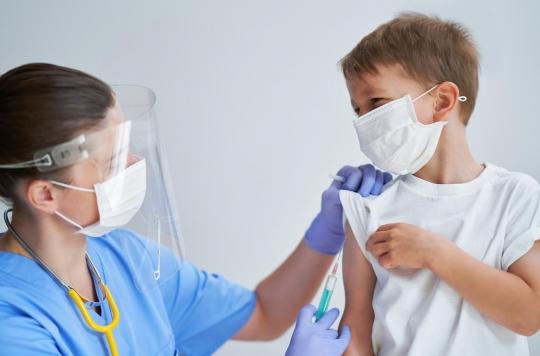The Pfizer laboratory has started clinical trials of its vaccine against Covid-19 on children under the age of 11. Research has so far not concerned this age group, which is not a priority for vaccination.

- Infections are on the rise among children
- This age group is not included in the current vaccination campaign
- Pfizer, which is launching a vaccine trial for children, estimates that it will be able to market its product in 2022
From March 15 to 21, 2021, the number of SOS Médecins medical acts for suspected Covid-19 increased by 30% in children aged 0 to 14, according to the weekly epidemiological update published by Public Health France this Thursday, March 25 . This growth is equivalent to 126 more acts compared to the previous week. The youngest are not the priority in the government’s vaccination strategy, which intends to protect the most fragile first. But, in anticipation of the extension of this vaccine campaign to other categories of the population, Pfizer has just started clinical trials of its vaccine against Covid-19 on children under 11 years old. The laboratory hopes to be able to market it in early 2022.
The first doses were given to children aged 6 months to 11 years
“We administered the first doses in children (…) to assess the safety, how it is tolerated, and the immunogenicity (i.e. the ability to trigger an immune response) vaccine (…) to prevent Covid-19 in children aged 6 months to 11 years“, explained the American company in a statement to Agence France Presse (AFP). And to add “we hope that the vaccine can be available for these youngest children by early 2022 (…) We are proud to be able to start this study if necessary for children and families eagerly awaiting an option” to get vaccinated. During the first phases of research, clinical trials mainly concerned adults, often in good health. They had never been carried out on children, whose vaccination was not a priority.
Few children with Covid-19 hospitalized…
Currently, in countries where it is licensed, the vaccine produced by Pfizer/BioNTech is given to people 16 years of age and older. The clinical trials that have just started concern children under 11, as well as 2,200 young people aged 12 to 15. But this laboratory is not the only one interested in children. Last week, Moderna also announced the start of clinical trials of its Covid-19 vaccine on patients aged 6 months to 11 years. According to the epidemiological point of Public Health France, published on March 25: “Children are very poorly represented among patients hospitalized for COVID-19 and among deaths (less than 1%).” It is therefore in anticipation of the extension of the vaccine campaign to the age groups least at risk that Pfizer and Moderna are starting these clinical trials.
Inflammatory syndromes observed in several hundred children with Covid-19
Children represent a large part of the population and their contamination is on the rise. Thus, even if they seem less affected by severe forms of Covid-19, it remains essential to allow their access to vaccination. And this for two reasons. First of all, Covid-19 can also make them sick. Indeed, Public Health France closely monitors pediatric multi-system inflammatory syndromes (PIMS), that is to say symptoms observed in children who have been affected by Covid-19. These are mainly heart damage such as myocarditis, an inflammation of the myocardium. 442 cases of PIMS were reported between the 1st March 2020 and March 21, 2021. Among them, 44% were hospitalized in the intensive care unit and 25% in the critical care unit, i.e. 196 and 110 children respectively.
Finally, just like adults, young carriers of the virus can also transmit it and contribute to its proliferation. Eventually, their vaccination could therefore be crucial to achieve herd immunity. It remains to wait for the results of clinical trials and the marketing of a vaccine suitable for this age group.
.















